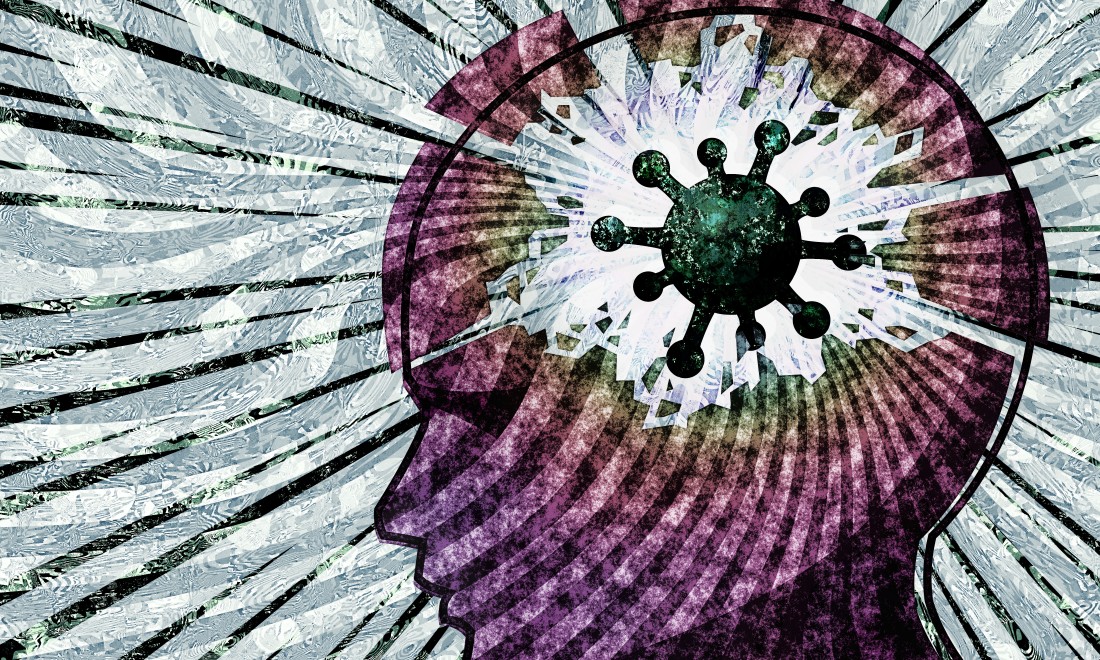Studies show that COVID-19 can leave lasting brain and heart damage
Research reveals effects on a small but significant number of patients including college-age athletes

COVID-19 can cause life-changing long-term brain disorders and heart damage to a small but significant number of patients.
Two new major studies have revealed that:
• A significant number of college athletes who contract COVID-19 develop myocarditis, which is an inflammation of the heart muscles that can prove dangerous.
Both studies were reported to a recent meeting of the Radiological Society of North America, an association of radiologists, medical physicists, radiation oncologists and other scientists. The association is based in Oak Brook, Illinois.
Brain problems in general population
The first study, conducted by researchers with the society, looked at the effect of COVID-19 on the brain.
A great deal has been written about the effect of the virus on the lungs, but little is discussed about the other organs that the virus can affect, says the lead author of the study Dr. Scott H. Faro, professor of radiology and neurology as well as director of the Division of Neuroradiology/Head and Neck Imaging at Thomas Jefferson University in Philadelphia. The brain is one of those organs.
In addition, the studies that had been conducted on the complications of the virus on the brain were based on relatively few cases.
Cases studied in 11 hospitals
To obtain a more complete understanding of the effect of the “devastating” virus on the central nervous system, the researchers studied almost 40,000 cases of hospitalized patients who had been tested positive for COVID-19. They set out to determine how many had suffered brain complications after they had contracted COVID-19. The patients were studied in seven university hospitals in the United States and four university hospitals in Western European countries. The studies were conducted from September 2019 to June 2020. The average age of the patients studied was 66. The findings have just been released.
Patients were confused
When patients were admitted to the emergency room at the hospitals they were usually confused and were suffering from a changed mental status, the researchers say. The next most common cause of admission was fever. Many of those admitted were suffering from heart disease, diabetes, and high blood pressure.
Brain scans such as an MRI or CT scan, showed that 442 of the patients—or 1.2 percent—were suffering from brain problems that were linked to the viral infection.
The complication that was most common was ischemic stroke—suffered when the flow of blood to the brain is narrowed or blocked by a blood clot—which was suffered by 6.2 percent of the patients. The second brain complication that was common was bleeding on the brain and inflammation of the brain, which were suffered by 3.72 percent of the group studied. Fewer than 1 percent of patients suffered from inflammation of the brain.
A small percentage of unusual findings were recorded by the researchers. Among them were an acute inflammation of the spinal cord and the brain, and a syndrome that mimics many of the symptoms that are shown when a person has a stroke.
Faro suggests that brain imaging should more often be ordered for patients suffering from COVID-19.
Heart inflammation in college athletes
In the study on college athletes, researchers found that a significant number develop myocarditis, which typically takes place as a result of a virtual or bacterial infection.
The inflammation, which is potentially dangerous and has been tied to about 20 percent of sudden deaths among young athletes, can be seen only on an MRI of the heart, according to the study also presented to the Radiological Society of North America. Myocarditis can affect the rhythm of the heart and its ability to pump. It often results in scarring to the heart muscle.
Big Ten conference schools studied
Clinicians at schools taking part in the competitive Big Ten athletic conference joined in gathering data on how often myocarditis occurred in student athletes who had recovered from COVID-19 viral infections.
Officials of the conference required all athletes who suffered from COVID-19 to obtain a series of heart tests, including an echocardiogram, a heart MRI, and blood tests as well as a complete review of the athlete’s medical history before they returned to play. These tests provided a special opportunity for researchers to gather information of the heart status of the athletes.
The leader of the Big Ten Cardiac Registry is Dr. Jean Jeudy, a professor and radiologist at the University of Maryland School of Medicine in Baltimore. He oversaw the gathering of all the data from the schools that made up the Big Ten conference. Jeudy reviewed the results of 1,597 MRI examinations on the athletes’ hearts at 13 schools that took part in the conference.
No clinical symptoms
The review revealed that 37 of the athletes, or 2.3 percent, were diagnosed with COVID-19 myocarditis, which is similar to its occurrence in the general population. A disturbingly high degree of the cases of myocarditis were found in athletes who had no clinical symptoms, however. A little more than half of the patients who were suffering from COVID-19 myocarditis were identified only when an MRI was taken of the heart.
The main problem is the presence of scarring of the heart or of continuous heart inflammation in the athletes, Jeudy says. Each of these can be a cause of an increased risk of arrhythmia or a basis for additional damage to the heart.
The long-term effects are still not known, he adds. In some cases athletes’ issues were resolved within a month, but MRI scans conducted on others showed continued abnormalities as a result of the initial injuries to the heart.
The patients in these cases are young and the effect of heart inflammation can possibly have an impact on their lives in a more significant way than is the case with older people, Jeudy says. For that reason, scientists want to continue to gather this information, he adds.





